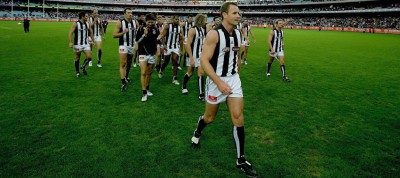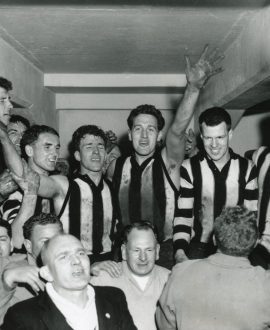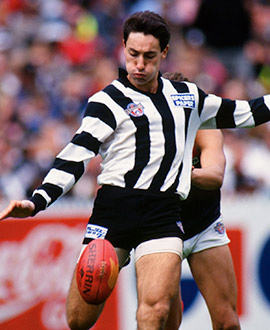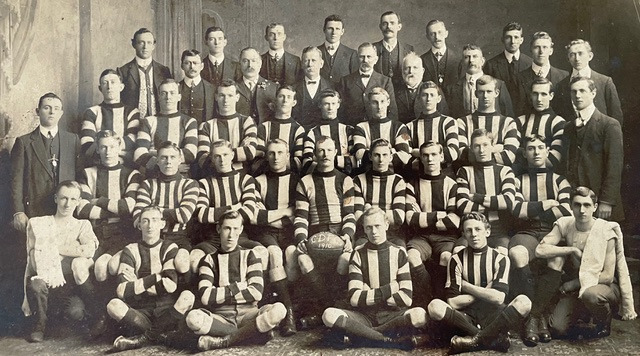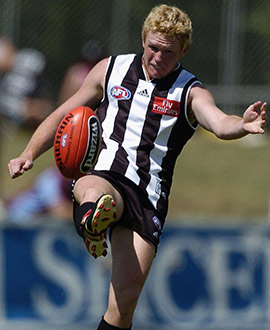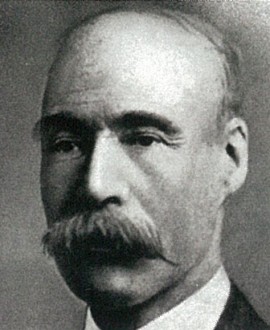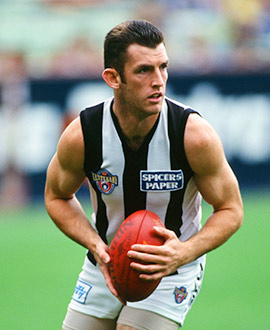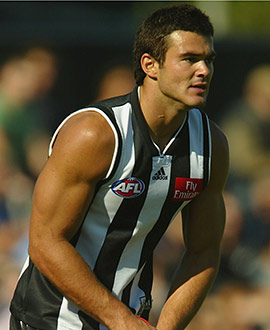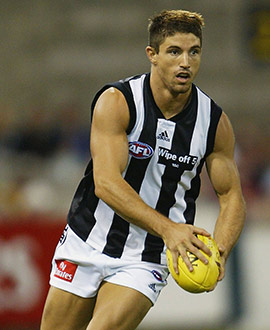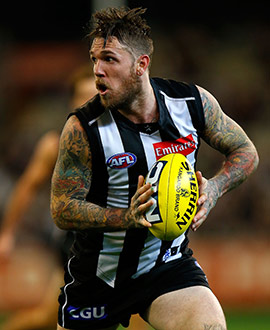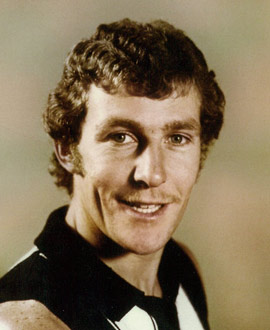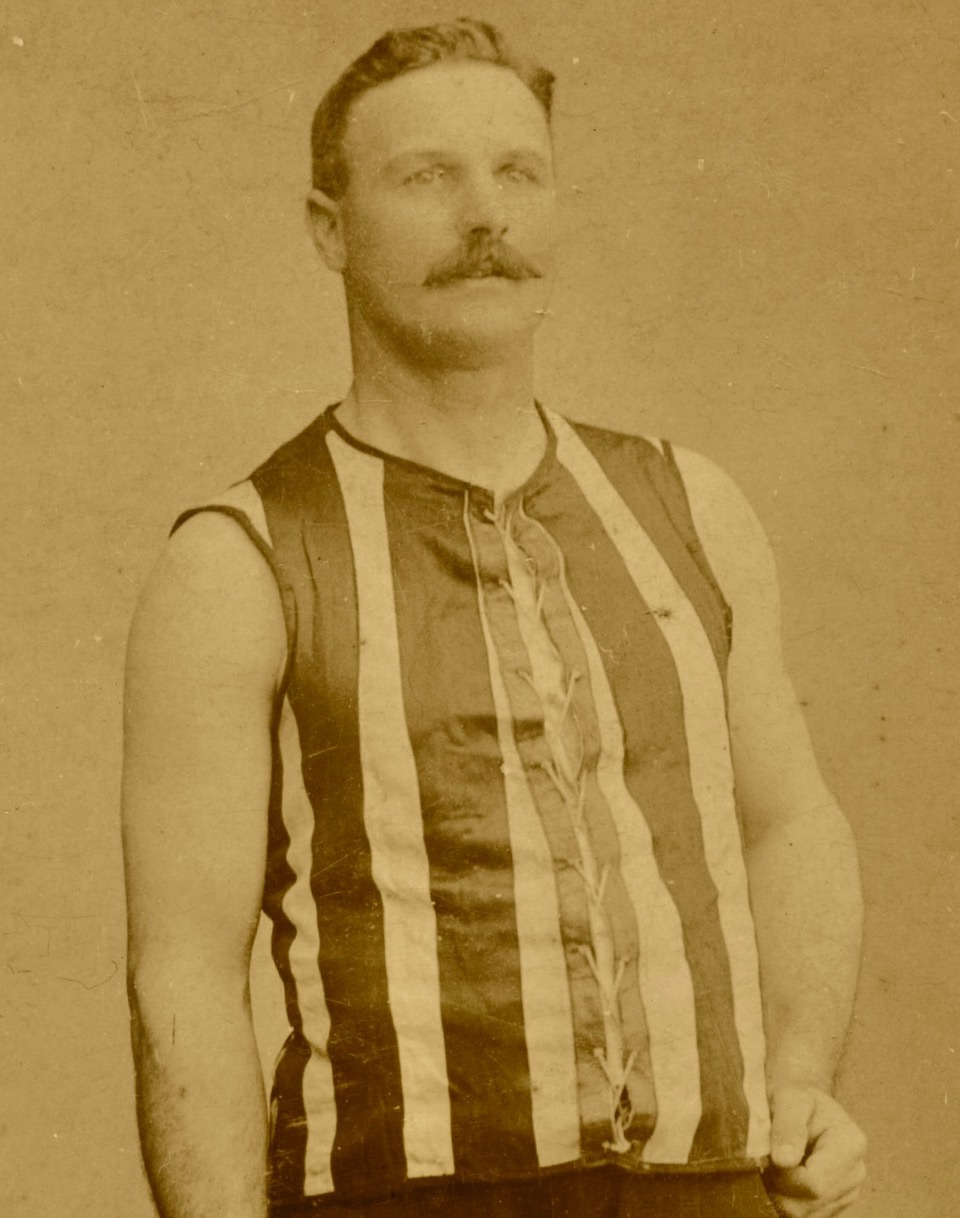By: Glenn McFarlane, Herald Sun journalist and Collingwood historian.
On 7 May 1892, Collingwood met Carlton for the first time.
But it wasn't any old match.
It was the first match in the club's history.
Between 1892 and 2015, the Magpies have taken on the Blues four times on 7 May - and each of the games proved noteworthy, for a variety of reasons. Each contributed something to the fabric of the one of the most fiercely contested rivalries in Australian sport.
1. THE FIRST MATCH, 1892
Collingwood may not have won that first encounter against Carlton in 1892, but everywhere other than the scoreboard, it was a resounding success.
Less than three months after a Collingwood Town Hall forum launched Melbourne's newest football club at a community meeting, somewhere in the vicinity of 16,000 fans flocked to Victoria Park to see the Magpies take to the field for the first time against one of the oldest VFA clubs.
The match - on May 7, 1892 - was billed as "a tug of war between the old and the new" and Carlton was generous enough to donate its share of the gate takings to the new club as it was building its future.
Shopkeepers on Johnston Street got their first taste of what would become a sporting phenomenon that afternoon.
The Argus explained this first Collingwood team was "comprised largely of juniors, though some of the 20 had played as seniors in Victoria and Tasmania. (But) in physique they can hold their own with the heaviest of the older, senior 20." Their captain, Joe Delahunty, did not play in that first game, due to illness, so the honour of leading the Magpies fell to George Watt.
Before the clash, the club's president, W. D. Beazley, presented the club with a flag as a memento, hoping that one day it would lead to a premiership pennant. Those new Magpie players each received a commemorative cap by a leading supporter, "Mr Vincent".
But there were still some issues to contend with for the fledgling club. For a start, the promised new grandstand was not yet completed. As a result, the inaugural Collingwood team had to change into their jumpers at the Yarra Hotel in Johnston Street, about 300 metres away from Victoria Park.
Still, the venue was, according to the scribe, "all that could be desired for football ... so the new club starts under very favourable conditions."
The guernsey was on display for the first official time, with one reporter noting "their colours are Black and White in diagonal stripes".
No goals came for Collingwood in that opening quarter, though there were some positive signs early for the home team. It wasn't until the second quarter that forward Alf Toll kicked the first six-pointer in the club's history, and it was followed by "loud cheering", setting the template for goal celebrations for the future.
The Magpies trailed at half-time. But it was only late in the game when some nerves started to show. At one stage Dick Langford was momentarily caught running in the wrong direction with the ball.
But another goal did come in that last quarter when Bill Proudfoot kicked the club's second for the game - it would be his only goal in 15 years in Black and White.
Carlton won the match, by three goals to two. But The Argus noted "Collingwood, although beaten, are to be congratulated on playing a fast and fair game ... they promise to be a formidable team in second flight."
But the real winner was Collingwood, the suburb. An influx of football fans showed that new entity had already gained a strong foothold in support, and there would be no turning back.
The Mercury detailed: "Collingwood footballers have to be complimented on the stir that they have made and will make from Saturday to Saturday throughout the present season."
"At the opening of the match some 15,000 or 16,000 persons assembled to watch the progress of this game. Out of that number we estimate that fully 7000 persons were visitors to Collingwood from other parts.
“They spent the afternoon in Collingwood and each paid their entrance fees to go (into) the ground and from the smiles that radiated the various countenances of the Johnston Street tradesmen generally, they were pleased at seeing such a large influx of persons into the city, as in all probability they left a silver coin here and there behind them that would not have chinked on the counter of a Johnston Street or Smith Street shop."
2. CREATING FOOTBALL MAYHEM, 1977
Eighty-five years to the day since the first time these two teams met, Collingwood inflicted what was then a record 102-point defeat of Carlton on 7 May, 1977.
Although that margin was later surpassed, it remains as one of the most emphatic victories over the Blues, especially for supporters with memories long enough to recall it.
It was Tom Hafey's sixth game as Collingwood coach, and it elevated the previous year's wooden spoon side to the top of the AFL ladder - a position it would not relinquish for the rest of the home-and-away season.
There were few signs of the one-sided clash to come in what was a relatively even first term. Collingwood led by only three points at the first break in play, but a seven-goal second term set the scene for the Magpies' dominance. Hafey's team bettered that with nine goals in the third term and closed the game out with three goals in the final term.
The Age’s Stephen Phillips said the Magpies "created football mayhem", saying they reduced the Blues "to a fumbling shambles ... bringing one era to an end and another to a most promising beginning."
Peter Moore, 20, and in his 45th game, had previously kicked 24 goals. On this day, he kicked seven for the match - the same tally as Carlton managed - including five in the third term. It could have been more as he gave off a handball to a grateful Graeme Anderson - who booted four goals himself.
Max and Wayne Richardson were dominant, Len Thompson was unstoppable in the ruck and around the ground, and Phil Carman controlled centre half-forward with relative ease.
Better still for the Magpies' fans among the 64,256 fans at Waverley Park, the Blues went 62 minutes without kicking a goal - from the 11-minute-mark of the second term until the 13-minute-mark of the last quarter.
Part of that was the dominant Collingwood backline. Bill Picken outpointed Robert Walls, Gerald Betts and Andrew Ireland were strong across half back, and the last line of defence included the previous year's Copeland Trophy winner Robert Hyde, full-back Ian Cooper and first-year Magpie Kevin Worthington.
Carlton coach Ian Thurgood said Collingwood had shown his team "how modern-day football is played" under Hafey.
The new Magpie coach, though, was playing down the win and top spot on the ladder, insisting "the backslapping and applause is nice, but I don't want it going to their heads. There is a long way to go."
But at least Collingwood fans could bask in the glory that night, knowing they had made their old rivals look second rate. 
The Carlton and Collingwood players line up for the National Anthem ahead of the Centenary Game in 1992.
3. PARTY POOPERS, 1992
It was meant to be the party of the century for Collingwood; in the end it turned out to be the hangover from hell.
As part of the Magpies' 100th birthday celebrations, a clash with Carlton was scheduled for a Thursday night at the MCG - one hundred years to the day of the first encounter between the two famous clubs.
Fireworks lit up the night sky that night, but as far as Collingwood fans were concerned, the match turned out to be more like a penny bunger.
The MCG's new Great Southern Stand cheered as a motorcade of club greats went around the ground, including the likes of Bob Rose, Lou Richards, Neil Mann, Ray Gabelich and Murray Weideman.
Richards wrote later: "I had a lump in my throat and a tear in my eye at the MCG. The lump came before the match when, along with all the other Collingwood and Carlton legends, I was driven around the ground in the motorcade. As for the tears they came around about three-quarter time, when I saw the writing on the wall for Collingwood."
The Magpies actually led by two points at quarter-time, but it got messy from there. The Blues were out by 11 points at half-time, then 25 points at three-quarter-time before extending it to 33 at the end.
Good Old Collingwood Forever had blared from the loud speakers before the game before 83,262 fans. Sadly, We Are The Navy Blues was the theme song that reverberated around ground at the end of the match.
Magpies coach Leigh Matthews lamented the 9.18 (72) score line, plus the fact that the club had had two more scoring shots than their opponents yet still soundly beaten.
"They kicked goals, we kicked points. You can't afford to keep missing shots like we did," Matthews said.
"It's the opposition, the venue, the crowd, the four points, the centenary . . . that probably creates pressure and we didn't perform that well.
"We've got to handle the pressure of the occasion and kick goals when you get the shots."
Carlton captain Stephen Kernahan buried the Magpies with seven goals, yet could only manage one Brownlow Medal vote. Adrian Gleeson scored the three votes and Matthew Hogg claimed two.
Peter Daicos kicked three goals for Collingwood, 18-year-old Shane Watson kicked 0.4 in his seventh game, while Scott Russell (celebrating his 22nd birthday) had a game-high 37 touches.
But too much was left to too few as the Blues were able to reign on the Magpies’ parade. 
First-year Magpie Dale Thomas sports Collingwood's 'alternative socks', something we haven't seen before or since.
4. A SMASHING, PLUS SWANNY ON THE RISE, 2006
A special roar went out across the MCG midway through the final term of the Collingwood-Carlton match on 7 May, 2006 when a "live ladder" flashed on the giant scoreboard.
The Magpies were on top. Yes, it was great to be thrashing the Blues - by 12 goals as it would turn out - but when the victory elevates you into the No.1 spot on the AFL ladder; it's just the icing on the cake.
On a day in which Collingwood wore unusual clash socks, black with a white stripe down the middle, Mick Malthouse's Magpies proved far too good for the Blues in James Clement's 200th AFL game.
The game appeared to be in the balance at half-time when Carlton led by two points, off the back of a late goal from Brendan Fevola.
Blues coach Denis Pagan dared to dream of a monumental upset: "I'll tell you one bloke who thought we were right in it and a real chance."
But Collingwood kicked 16 goals to four in the second half to produce a landslide 72-point victory. It elevated Malthouse's team to the top, even if the coach played down the significant of the moment after the game.
"What relevance is it? None," the coach said of the ladder position. "Not one bit of relevance. Round six means round six. Yes, it is better to be where we are now than where we were last year.
"But at the end of the day, it doesn't get you into the eight, it gives you a kick-start, but they don't give you a discount."
Shane O'Bree had 31 touches for the Magpies, Brodie Holland was impressive with 28 and Paul Licuria had 27. Alan Didak top-scored for his team with three goals. Anthony Rocca kicked two goals, but was well held by Lance Whitnall, while Chris Tarrant and Nathan Buckley were solid without being spectacular.
A 22-year-old enjoying his best start to a season, and playing his 36th game, was impressive. He had 24 touches, kicked two goals and had no ink on his arms. His name was Dane Swan.
Swan said after the game: "I had a bit of trouble off-field a couple of years ago and Mick sort of put an ultimatum to me. I said, 'Give me one more life', and he just said, 'You are on your last legs, do something about it'.
"Then I realised what I have to do to become an AFL footballer, I don't think I am there yet, but I have taken a few steps to where I want to be."
"Mick has shown some faith in me to play in the midfield and hopefully I'm repaying the faith."
The Herald Sun recorded: "Yesterday at the MCG, Swan took another significant step towards repaying his coach by being an integral part of the Collingwood midfield that smashed Carlton in the second half."
By the end of the year, Swan would finish sixth in the Copeland Trophy on his way towards winning three successive best and fairest awards in 2008-09-10. And the young Pies were building towards a flag four years on.


